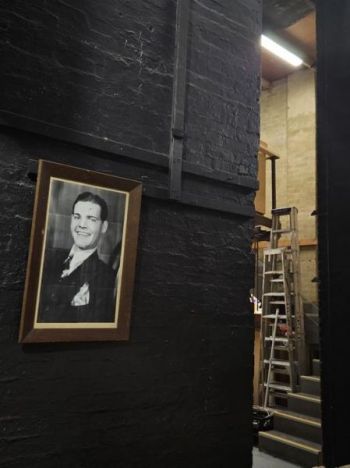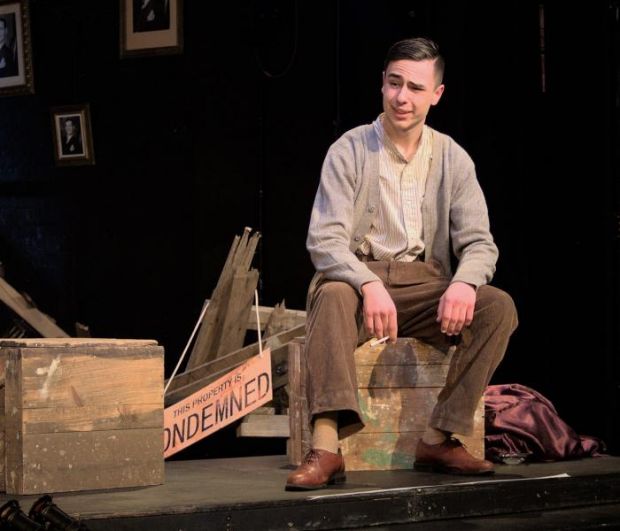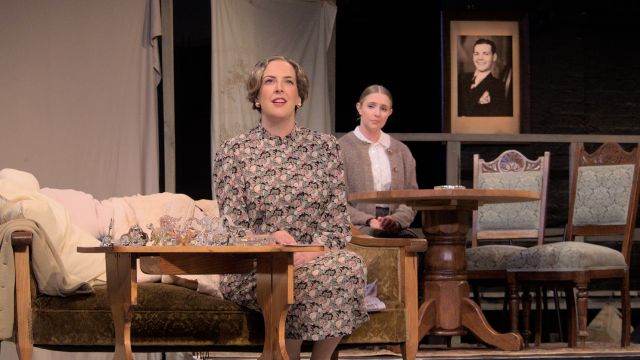The Glass Menagerie
Rarely has set, sound, light, language and performance so perfectly coalesced as in this production of Tennessee William’s The Glass Menagerie.
Jill Munro chose to use the full depth of the Playhouse stage, exposing the rear brick wall. The depth of the set was counterbalanced by different levels with the elusive ‘Gentleman Caller’ elevated to the unattainable height of the upper loading dock. A sign declared the apartment set to be ‘Condemned’ (both unfit for use and a place of hellish torments). Its dereliction was evident. The palette was bland, almost sepia, and brought to life with a well-considered soundtrack and warm lighting.
Light is a motif in this play which Jason James exploited well. Laura Wingfield’s glass animals are best appreciated when held up to the light as is Laura herself. James created a warm oasis of candlelight for the scene in which Jim O’Connor evaluates Laura. The absent Wingfield father, in numerous iterations on the wall, is an omnipresent smiling reminder of abandonment as lit by James.

The show soundtrack highlights the contemporary music of the era in the form of Laura’s Victrola records and the intrusion of the sound of the band from the Paradise Dance Hall (with its brief deceptive rainbow-coloured lights) from across the street. This represents the life outside in which Laura will never participate. Laura is most often associated with a piece of music (which may or may not be Siddhartha Barnhoorn’s ‘Embrace Life”) that is predictable, slow, and constrained. The Victrola plays the tunes of the outside world but Laura’s soundtrack is classical, diatonic and arpeggiated.
Some of the music in this self-aware memory play is at the behest of Tom Wingfield. Tom, played by Julius Lovell, acknowledges the “fiddle in the wings”. He is both within and without the play, establishing the tone and evoking the ambience. As narrator, Tom Wingfield shares his truth disguised as an illusion, a two act self-justification of the need to abandon his mother and sister as his father had done. Lovell delivered the poetry of Tennessee William’s with sensitivity, was a credible drunk and the fight with his mother was a well-directed emotional highlight. Lovell had a lot to manage and did it well.
Kate Choriaziak played a poignant Laura, glass-like in her delicacy and lack of fitness for the world. This unique character, like the broken unicorn, was expressed in much more than a crooked bone but in a fragile psyche and divergent perception of the world. She was ephemeral in white, pleated chiffon.
Will Norris as the Gentleman Caller, Jim O’Connor was assured on stage. Norris trod a line whereby it was impossible to tell if his character was genuine, malevolent or merely clumsy and thoughtless. He was the aspirational ideal in a well-fitting suit.

Karen Kluss as Amanda Wingfield, was commanding. In an accent which never faltered, she berated and cajoled, reminisced and schemed. Kluss was powerfully threatening when exposing Laura’s deception, and pathetically ludicrous in her yellow dress with her jonquils. Kluss managed to be abhorrent and pitful but always in control. Like Laura, Amanda Wingfield was also unfitted for the world in which she found herself, with disillusionment turning to rage and cruelty. Kluss was frightening and repulsive but absolutely compelling as Amanda.
Jeff Kevin’s direction elicited the best from his cast and in a harmonious fusion of lighting, music, set and performance.
Anne Blythe-Cooper
Photographers: Elise Bagorski and Wayne Wagg
Subscribe to our E-Newsletter, buy our latest print edition or find a Performing Arts book at Book Nook.

